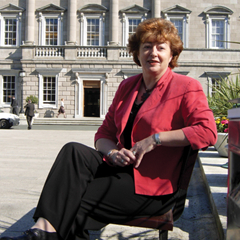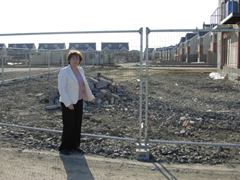Independent thinking: Catherine Murphy
 Transferring the control of “day-to-day” public services from national to local government should be a priority for the Government, independent TD Catherine Murphy tells Owen McQuade.
Transferring the control of “day-to-day” public services from national to local government should be a priority for the Government, independent TD Catherine Murphy tells Owen McQuade.
“Local issues combine to actually paint a picture of the things that need to change,” remarks Catherine Murphy.
The Kildare North independent TD argues that achievements shouldn’t be measured by elections but instead by “things you can practically see in terms of the difference you make to people’s lives”.
One of fourteen independents in the Dáil, Murphy believes that within the group there will be people “who will be good on theory” but there will also be others “who will have a very practical knowledge of how people live their lives”. She sees this as one of the most important factors in bringing about change.
While Murphy was growing up politics was always “in the house”. Her grandparents took part in the 1916 Easter Rising and there would have been “decent rows” between her father and his brothers about politics.
Going to school in Goldenbridge, near Dublin, shaped her politics as it was the first time she “encountered real poverty” and she recalls it as a “very important experience”. Another major influence was her father’s strong trade unionist beliefs and his involvement in the builders’ strike in the 1960s.
Murphy’s greatest achievement as a politician, she believes, was the reform resulting from a national campaign against management companies in new housing developments. Her campaign opposed management companies charging fees for the maintenance of basic public services, such as public open spaces, which in some areas of the country were funded from general taxation.
She raised it with the Minister at the time, Dick Roche, and “there was a certain element of not believing you”. Murphy recalls: “I was raising it and he was saying: ‘Show me the evidence.’ So I went off and gathered my evidence, went to him with it and when he saw the evidence, he immediately instructed the local authorities to cease the practice.”
Joining together
Within days of the general election results, the independents began making contact with each other and five United Left Alliance members, to set up a technical group so that they could enjoy the same privileges as a political party.
“We made contact with each other fairly quickly and a lot of it was grapevine stuff to get the ball rolling on it. That group was set up the day the Dáil convened,” comments Murphy.
As well as taking part in leaders’ questions, the group can also submit private members’ motions and have a share of priority questions to ministers. Murphy believes it is vital that new faces get the chance to make their mark in the Dáil: “If change is going to come, it’s going to have to come in different ways.”
She continues: “We’re not the same; it’s a very diverse group. The one thing about it is there is terrific generosity within that group. There’s an acceptance of difference and essentially I think that there’s far more co-operation in it than you would expect there would be.”
While Murphy’s official title is the group’s whip, she doesn’t see that as her main function: “The understanding of the word whip is that you are whipped into line and that’s the party line. But the thing is there is no party line with our group.”
The technical group holds a weekly meeting and Murphy also attends the whips’ meeting. However, it is difficult to predict what the agenda will hold: “With a government the size it is, a lot of stuff happens and we don’t know what’s coming down the line in terms of legislation and what’s available. Needless to say, government will always dictate most of that, irrespective of the size of government.”
Finding common ground will be key to the technical group’s success and its members will look for space to “set the agenda”, says Murphy. “We’ve already set up a template and within that template we’ll more or less consider what time we have on what items and go back and share that time out.”
However, the practicalities of organising the group can sometimes be problematic: “With the best will in the world you set out the times that people will speak and then maybe a group don’t put a speaker up and there’s an extra slot and you’re trying to fill that.”
There are some stark differences since Murphy’s last term in the Dáil (2005-2007). “It is a bit of a culture shock to see Fianna Fáil wedged in between the independents and Sinn Féin. They are quite a tiny group and it is quite astonishing to see it,” she observes.
She has also noticed a change in atmosphere throughout the Dáil: “I felt in the last Government, when I was in, there was a certain smugness about it; I don’t notice that about this Government. But clearly they are not in long enough for that to have happened.” She thinks it is still “very early days” and it will be a while until it will “be valid to criticise them for not doing things”.
Murphy’s top priority is political reform but she predicts that economic issues will also dominate a lot of her work.
While she would like to see “meaningful political reform” introduced during her term, it shouldn’t all be about cuts in spending. “It should be about a vision. Certainly we’ve got to get efficiencies, we’ve got to do better things with less money but at the same time we’ve got to deliver quality public services.”
Dáil reform
She believes that the primary requirement in Dáil reform is “to transfer the delivery of day-to-day public services, such as education, healthcare, social welfare and community facilities, to local and regional government”. This is the norm in other European countries, she says, where the “primary focus of Members of Parliament is legislation and other matters of national importance”.
Local government reform is also at the top of her agenda: “I think we have to be looking at the institutions of the state as being solutions rather than problems. We have a town council system that is bedded in the 1854 Town Improvement Act but there hasn’t been a town council established since 1988 and that was the one I was a member of, the Leixlip Town Council.”
A strong regional authority system should be introduced, she contends, which would be made up of three regional authorities. “I think it’s going to be evolutionary rather than revolutionary change but I would like to see, over time, the county council system phased out in favour of a regional council model.”
Murphy argues this would be strong, democratic and accountable, as well as being able to take a regional rather than a very local view on issues like the delivery of schools and waste management.
However, she believes there would also need to be a district council model underneath the regional authority: “You’re never going to have a real Oireachtas reform where you take the local issues out of national Parliament unless you put in a system that is capable of delivering the kind of se
rvices that people have an entitlement to.”
The current model is “outdated”, claims Murphy, and “hasn’t kept pace with the pattern of growth of this country”.
Losing influence
Murphy lives just 11 miles from the Dáil and recognises that her journey to work is “very different” than somebody who travels from Kerry or Donegal.
“The 9-5 thing may well suit those of us who commute but I think there has to be some level of fair play for people who have to commute long distances,” she comments.
She is critical of the “very circular route” you have to go through in the Dáil. “A lot of the procedures here seem to be designed in a very male format. Women tend to be multi-taskers, they tend to look for the more direct route of getting things done and I think that would be one of the things that irritates me.”
During her last term, Murphy was a substitute on the European Committee of the Regions (CoR), which she found a “really interesting experience” as it helped her to see the ideas and cultures of different countries. While the CoR was viewed as “very important” by countries such as Italy, Spain and France, it seemed to be a “minor deal” for Ireland.
She says she can see how Ireland could lose influence in Europe: “I can see how that happens, where you don’t take some of these institutions seriously, and the Committee of the Regions, I don’t think, is being taken seriously. It is a missed opportunity.”
Being independent
Formerly of the Workers’ Party, the Democratic Left and Labour, Murphy became an independent in 2004 and was elected to the Dáil in a 2005 by-election to represent Kildare North.
She regained the seat in the general election this year and was appointed the technical group’s whip. She is involved in politics “to deal with the political issues rather than get sidetracked and into petty fights that happen within parties.”
Murphy says she is “amazed” at how the status of an independent TD is often viewed as an “inferior status” to someone in a political party.
She adds: “I don’t feel it’s at all inferior and in actual fact you have to stand on your own two feet as an independent. It’s a valid status.”
The message Murphy received on the doorsteps was that there is a need for better public services. She argues that this shouldn’t be “code for cuts.”
Murphy enjoys spending time with her grown up children and her grandchild.
She also loves going along to football matches every couple of weeks and watching sport on television.
She has a “huge interest” in genealogy and family history and likes reading non- fiction in her spare time.






